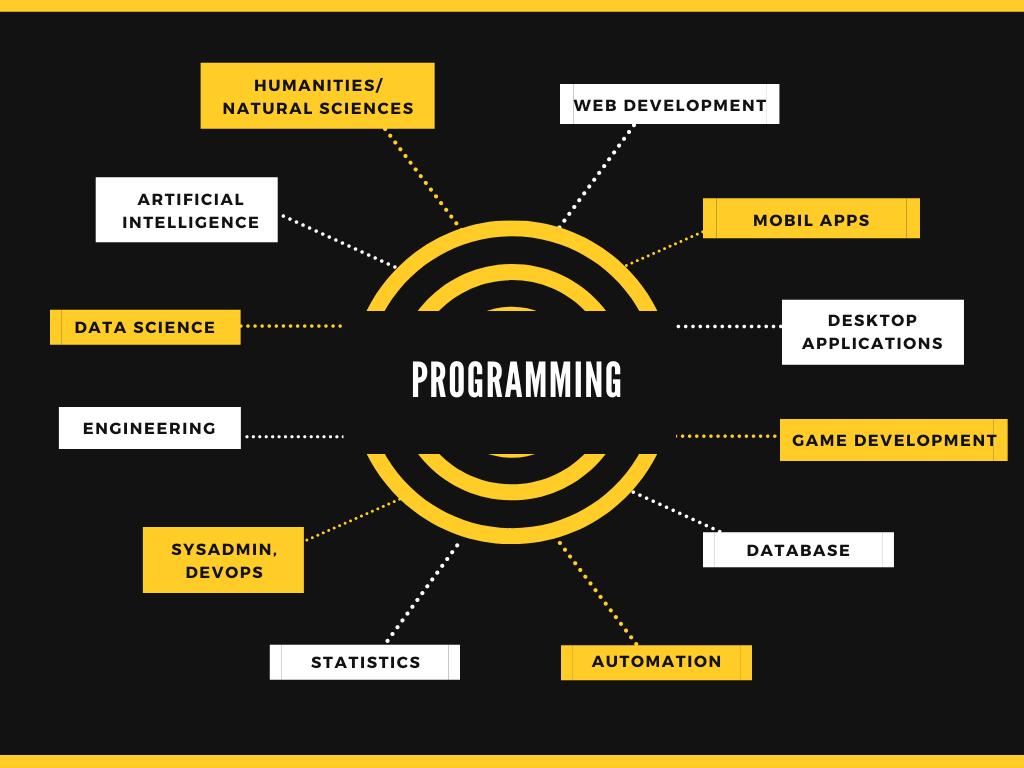Have you ever wondered how many people it takes to build all the technology around us? Better still, curious about the behind-the-scenes of how the tech actually works?
You’ve probably come across the term “coding,” and have heard that it’s a great place from which to launch your tech career.
But what is coding really? Is it the same as programming? Where are you likely to use code? Is it that important, or is it over-glorified?
How does it really work “behind the scenes”? What kind of jobs can you get with coding skills? And where would you get started with learning how to code?
Let’s explore the answers to these questions in this article. If there’s one topic that you’d like to get to first, just use the clickable menu:
- Coding definition
- What’s the difference between coding and programming?
- What is coding used for?
- Why is coding so important?
- How does coding work?
- Is coding hard to learn?
- Which jobs use coding?
- How to learn coding
Are you ready to start discovering all about coding? Then let’s begin!
1. Coding definition
So, what is coding? Coding can be defined as writing instructions for computers and other hardware. The computer is then able to read the instructions (called “programs”) and do what you have asked it to do.
Computer language is different from human language. A human needs to learn “computer language” (commonly known as programming languages) to write programs that the computer can understand.
Some “computer languages” include Python, Java, C, C++, and JavaScript.
Computers use compilers and interpreters to convert programs into what’s known as machine-readable code.
“Machine code” is information stored in zeros and ones (binary digits).
A person who writes programs is called a coder or programmer.
Coding and programming are usually used interchangeably. But is that correct? Let’s compare the two terms in the next section.
2. What’s the difference between coding and programming?
In the previous section, we saw that the terms “coding” and “programming” can be used interchangeably. This is because both involve writing programs.
The two terms, however, differ in terms of their scope. In addition to writing code, a programmer is also involved in high-level problem-solving.
For example, a programmer might advise on the technologies that should be used in a project. This is because they have things like security and scalability in mind.
A coder’s responsibility, on the other hand, will involve writing code that results in a certain user story being fulfilled.
For example, if the user story is that Alex should be able to receive an email when they click the “forgot password” button, a coder will write a program to help Alex retrieve their password.
A programmer will need to take a factor like scalability into consideration when choosing the database to be used to store Alex’s data. (Will the database still work when thousands of users are simultaneously trying to retrieve their passwords?)
If you want to further explore the similarities and differences between these terms, check out our coding vs programming guide.
3. What is coding used for?
It’s quite difficult to come across a company, organization, or industry where coding isn’t used.
All the big tech companies—Meta, Amazon, Netflix, Google, and Apple (known as MANGA, MAANG, or MAGMA)—use code.
Small businesses and organizations also use code to build their websites.
The magnitude with which code is used differs. Giant tech companies will use code for most of their products. They’ll also use different programming languages, depending on the product or service that they are building or offering.
Small businesses and organizations are less likely to use a wide range of languages since they have fewer products, but it’s still an important part of how they function.
If you think about it, coding is used for practically everything.
Here’s a list of some ways code can be used:
- To build operating systems (like Windows, Android, iOS, and Linux)
- To build programs that can only run on a command line
- With IoT (the Internet of Things), for example, to ensure that your garage door sensors work correctly
- To build static websites with HTML
- To build applications for the web and mobile devices
- To build products and services for customers, for example, Netflix and Spotify
- To build open-source software (software that developers can use for free, and contribute to)
- To build libraries, frameworks, plug-ins, and add-ons to extend the use of software. For example, coding was used to build React, a JavaScript framework that is used to build frontend applications
The list could go on and on. We haven’t even begun to talk about how coding is used in fields like healthcare, finance, and transportation. And yes, coding is involved in taking people to Mars—rovers and robotics, anyone?
4. Why is coding so important?
As we have seen in the previous section, coding is really quite significant in almost every part of our daily lives and how we go about our business.
But in what other ways is coding important to learn?
It’s a great way to build a career in tech
Technology has permeated every aspect of our lives. You can order your favorite meal via a mobile app, transfer money from the comfort of your home, and switch your lights on and off from your phone—even when you’re not home.
At the core of all this technological advancement is coding. Teams of developers, designers, coders, and programmers work together to build this software that makes our lives so convenient.
Coding has therefore become a highly valued skill, as companies the world over work towards building solutions that make their customers’ lives easier.
Companies also strive to understand their customers’ needs in order to offer better products and services.
Coding is therefore one way to build a great career in tech, where you get to build solutions to real-world problems.
You get to develop skills that you can use in your personal life and in the rest of your career, too
Aside from the opportunities for a career in technology, coding helps you develop skills that you can use in your personal life and career, such as logical thinking and problem-solving.
As you work with different people in your team, company, and even customers, you learn other skills like communication and collaboration.
You can build a tech business
With coding skills, you can build a product that people will love and use daily, like YouTube, TikTok, and Instagram, that can eventually become a business.
The best part is that you can build the tech yourself (something called “bootstrapping” in the startup world) without having to pay people with coding skills to build even a prototype for you.
You could even build a company where you build software for other businesses, or become a freelance web developer to do it on a smaller scale. The options are limitless.
It can help with work-life balance
If you’re a fan of flexible work options, coding is one of the careers that offers lots of WFH (Work From Home) options. In fact, according to the 2022 Jamstack Developer Survey, 82% of developers work from home at least half the time.
You can even work as a remote web developer for a company in a different part of the world, for example.
If you enjoy traveling or changing environments, you can carry your work with you and become a “digital nomad,” something that is becoming increasingly popular in recent years. It’s no surprise, then, that it’s one of the top remote jobs out there at the moment.
It’s important to factor in the amount of time working remotely frees up. Since you don’t have to go to the office every day, you can spend the extra time resting, with your family or friends, or even on a hobby.

5. How does coding work?
In previous sections, we looked at “what is coding,” defining it as writing instructions for computers and other hardware. For a computer or any other hardware to “follow” these instructions, they need to be “translated.”
Coders or programmers write these instructions in programming languages like Python or JavaScript.
The instructions need to be “translated” into zeros and ones, which is called binary.
The computer then reads the instructions as sequences of zeros and ones and does what you asked it to do.
This process is quite fast, and you barely notice it.
Sometimes, the process seems to be automated. For example, when you type on your computer or phone keyboard, the device will need to “interpret” each keystroke, show it back to you, and combine it into a sentence as you type it.
A programmer had to write the instructions that tell your computer how to recognize keystrokes and their content (alphanumeric letters) and put them together into sentences.
They then wrote those instructions to run every single time you type on your phone or computer keyboard.
6. Is coding hard to learn?
Coding, like any new skill, is relatively hard to learn. Knowing “what is coding” is just the tip of the iceberg.
The good news is that while it might feel really difficult—even downright impossible—at the beginning, as you begin to understand the concepts and piece the information together, it becomes easier.
Once you understand the basics, going on and mastering coding is even harder to achieve. You’ll need to commit to learning every day.
Coding is an enormous world, and things keep changing. You might also want to focus on a certain area, like cloud computing, machine learning, or data science.
We’ll explore different coding jobs that you might want to explore in the next section. For now, you can learn more about whether coding is actually hard to learn in this full article.
7. Which jobs use coding?
As we mentioned, a good number of jobs require you to understand what is coding to carry it out. For example, if you want to publish a blog, you might need some basic HTML and CSS knowledge, depending on the platform that you use to publish.
In this section, though, we’ll focus on some of the jobs where you spend most of the time writing code.
A great way to come across different coding roles is by reading through company job descriptions.

Software engineering jobs
Software engineering is a bracket term for lots of coding-related roles. Software engineers are sometimes referred to as “developers.” You can learn a little more about the differences (and similarities) in our guide to software engineering vs web development.
Software engineering roles can be categorized based on a few factors:
- Programming languages
- Technology stack
- The “part” of the software
- Device, platform, or product
Software engineering roles based on programming languages include:
- Python developer
- JavaScript developer
- Ruby developer
- PHP developer
These developers specialize in particular languages and frameworks. Software engineering roles based on the technology stack include:
- MERN (MongoDB, Express, React, and Node.js) stack developers
- PERN stack developer (Postgres, Express, React, and Nodejs) developers
- MEAN (MongoDB, Express, Angular, and Node.js) stack developers
- LAMP stack developer (Linux, Apache, and MySQL)
Software engineering roles based on the “part” of the software the engineer is building include:
- Frontend developers (build the “user-facing”) part of the code
- Backend developers (build the “backend”)
- Full-stack developers (build both the frontend and backend)
Software engineering roles based on device or platform:
- Android developers
- iOS developers
- Web developers
- Video game developers
- Salesforce developers
- WordPress developers
The above roles tend to overlap. You might find that someone works as a backend web developer, for example.
Other coding-related jobs include data scientists, data analysts, cloud engineers, DevOps engineers, database administrators, and UX designers.
Some of these jobs, like DevOps engineering, need you to have worked as a software engineer before.
8. How to learn coding
There are several paths to learning to code:
- You can go to a conventional school for a Computer Science degree
- Take a short course designed or sponsored by a “conventional school”
- Enroll in a coding boot camp (online, in-person, or hybrid)
- Learn by yourself
Whichever path you take, you might want to try out coding first before committing to any learning path. The free CareerFoundry coding short course is a great place to start.
For a sneak-preview of what’s inside this 5-day coding course, check out the first video tutorial from Abhishek Nagekar, an engineer at Mozilla:
9. Final thoughts
By now, you must know what is coding! We’ve walked through what the term means, compared it with programming, explored what coding is used for, why it’s important, how it works, discussed whether it is hard to learn, reviewed some professions that you can pursue with coding skills, and talked about some options to get started with your coding journey.
We hope that this knowledge proves helpful as you figure out the next and most important steps in your tech journey.
Interested in changing careers to coding, or learning coding skills to transform your current one? Then the CareerFoundry Full-Stack Web Development Program is a popular choice. Flexibly-paced, you’ll learn with the assistance of a dedicated tutor and mentor, who will help guide you on your way to becoming a professional software developer.
If you’d like to read more about the world of coding, check out these articles:
